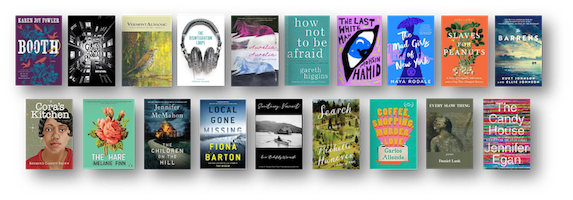Episodes

Monday Jan 27, 2014
James Tabor - Archive Interview #280 (1/27/14)
Monday Jan 27, 2014
Monday Jan 27, 2014
This week’s Write The Book prompt is to write about an adventure you've had as an adult.
Good luck with this exercise and please listen next week for another.
Music credits: 1) “Dreaming 1″ - John Fink; 2) “Filter” - Dorset Greens (a Vermont band featuring several South Burlington High School students.

Monday Jan 27, 2014
Willow Bascom - Archive Interview #279 (1/20/14)
Monday Jan 27, 2014
Monday Jan 27, 2014
Interview from the archives with with Willow Bascom, author and illustrator of the book, Paisley Pig: A Multicultural ABC, published by Publishing Works.
This week’s Write The Book prompt is to write a poem, memory, scene or story about a library and its librarian.
Good luck with this exercise and please listen next week for another.
Music credits: 1)
“Dreaming 1″ - John Fink; 2) “Filter” - Dorset Greens (which was a
Vermont band in 2008, featuring several South Burlington High School students, now grads.)

Thursday Jan 16, 2014
Carolyn Conger, PhD - Interview #278 (1/13/14)
Thursday Jan 16, 2014
Thursday Jan 16, 2014
Author Carolyn Conger, PhD, whose new book is Through The Dark Forest: Transforming Your Life in the Face of Death, published by Plume.
This week’s Write The Book Prompt is one of many exercises that appear in my guest, Carolyn Conger’s book: Through The Dark Forest. She has generously agreed to let me include it here. This exercise is called Expansion, Contraction, or Balance? The questions in the exercise are designed to speak most directly to people who might be facing death more imminently, but you can adjust them to your own situation. Ultimately, of course, we can all benefit from considering what the end of our lives will look like, and living a full life for as long as we can.
This exercise is meant to initiate a meaningful inquiry into being present. Take out your journal and write about how you are experiencing the rhythms of your life. Address these questions and add whatever comes to mind about keeping your life big. Accept what you discover without judgment.Good luck with this exercise and please listen next week for another.There are no correct answers to these questions. You are exploring your rhythms of awareness in your life now, and noticing how, when and where you are present. You have the right to make these choices, and it’s healthier to make conscious choices about what you are doing, rather than falling into automatic behavior.
- Is there anywhere in my life I’m hiding, giving up, or disappearing into my illness?
- When do I feel most alive, most fully myself?
- Are there areas of my life where I want to be more present?
- Are there times in my life--perhaps during medical procedures--when it’s appropriate not to be aware and present?
- Do I feel a balance in the amount of time I’m in expansive states, neutral states, and contractive states?
- What do I feel about the idea of being present for my own death?
~ Excerpt From Through the Dark Forest: Transforming Your Life
in the Face of Death, by Carolyn Conger, published by Plume.
Music credits: 1) “Dreaming 1″ - John Fink; 2) “Filter” - Dorset Greens (which was a Vermont band in 2008, featuring several South Burlington High School students, now grads.)

Wednesday Jan 08, 2014
Barbara Henning - Interview #277 (1/6/14)
Wednesday Jan 08, 2014
Wednesday Jan 08, 2014
Poet and prose writer Barbara Henning, whose latest book is A Swift Passage, published by Quale Press.
This week’s Write The Book Prompt was generously offered by my guest, Barbara Henning. She told me that she has used this at the start of a new class, to help her students ground themselves. The prompt is called “FROM HAIKU TO PROSE” - Go for a walk (or remember a walk) and write down everything you see. Then write three haiku using words from your notes. Try to make each haiku a sentence. Haiku celebrate the ever-transforming universe by describing two actions in a single moment in time, an epiphany as the writer becomes aware of reality by observing something simple, striking and absolutely ordinary. Don't worry about syllable count; instead for each haiku, write one short line, one longer line and another short line. The world turns, the seasons change, everything is moving. See if you can get a sense of the season into your haiku and shy away from metaphors, abstract ideas, generalizations and statements about the writer's feelings; stick with things in movement. Haiku do not lecture on ideas about truth, goodness and beauty. They ARE truth and beauty. Here are two haiku, the first by Basho and the second by Richard Wright.
The peasant’s child,
husking rice, stops
and gazes at the moon.
A thin mangy dog
Curls up to sleep in the dust
Of a moonlit road.
Now tell the story of your walk and embed these haiku as sentences into your prose. If you consider your life a journey, every event that takes place is part of that journey, every action a part of another action. Even these momentary observations are small actions. Instead of breaking for the lined poem, let them flow right into the prose as sentences. In this way, you will have a poetic rhythm in your flash fiction or prose poem. You can use this same technique as a regular journal exercise or as a way to begin a story or a poem.
Good luck with this exercise and please listen next week for another.
Music credits: 1)
“Dreaming 1″ - John Fink; 2) “Filter” - Dorset Greens (which was a
Vermont band in 2008, featuring several South Burlington High School students, now grads.)

Tuesday Dec 31, 2013
Daniel Lusk - Interview #276 (12/30/13)
Tuesday Dec 31, 2013
Tuesday Dec 31, 2013
Award-winning Vermont poet Daniel Lusk, whose latest book is Kin, published by Wind Ridge Books of Vermont.

